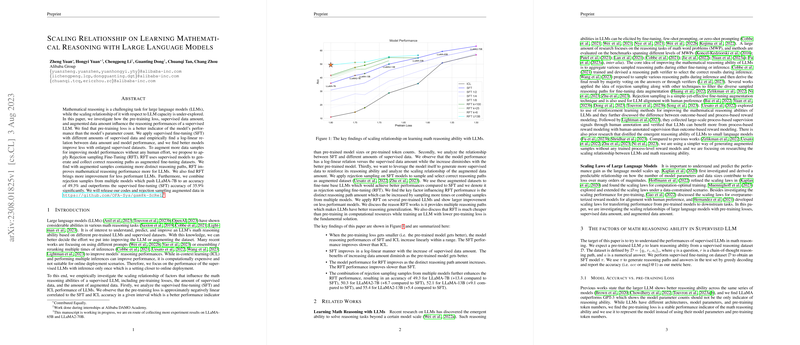Introduction to the Scaling Relationship in Mathematical Reasoning
LLMs have become increasingly adept at tackling mathematical reasoning problems, a development of particular interest for both theoretical and applied AI research. The extent to which different factors influence an LLM's capacity for mathematical reasoning is a question of paramount importance for optimizing their training and deployment.
Pre-Training Loss as Performance Indicator
A crucial finding of the analyzed paper is that pre-training loss is a better indicator of an LLM's mathematical reasoning ability than just the model's parameter count. This suggests that focusing on lower pre-training loss could be more effective for improving an LLM's performance than increasing its size. Supervised fine-tuning (SFT) with various amounts of supervised data reveals a log-linear relationship, with diminishing gains for larger, better-pre-trained models.
Rejection Sampling Fine-Tuning (RFT) Strategy
To achieve superior model performances without manual data generation, the researchers propose Rejection sampling Fine-Tuning (RFT). The strategy involves generating correct reasoning paths with a supervised model, which are then used as an augmented dataset for fine-tuning. RFT results vary depending on the distinct reasoning path amount, which can be adjusted by modifying the number of samples or combining samples from multiple models. Notably, this method is not only computationally cheaper than extensive pre-training but also brings marked improvements for less performant LLMs.
Enhanced Performance with Combined Rejection Samples
Applying RFT and combining rejection samples from multiple models significantly improves LLM capabilities, pushing the performance of models like LLaMA-7B by over 13 percentage points compared to SFT. This finding indicates that model performance could potentially benefit from diverse reasoning paths, leading to better generalization while reasoning.
Implications and Future Directions
The paper’s insights into the factors influencing LLMs' mathematical reasoning abilities—specifically the impact of pre-training losses, the quantity of supervised data, and the amount of augmented reasoning paths—are poised to inform future LLM training strategies. Moreover, the relative ease and efficiency of RFT compared to extended pre-training underscore its potential as a key approach for enhancing LLM performance on mathematical reasoning tasks.
In conclusion, while the pursuit of more efficient and effective LLMs continues, it has become clear that optimizing pre-training processes and utilizing innovative fine-tuning approaches like RFT hold significant promise for improving LLM reasoning skills in mathematical domains.
